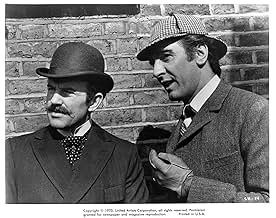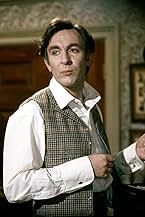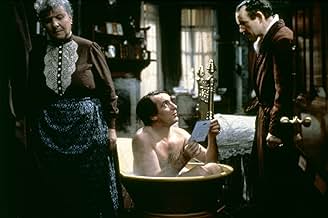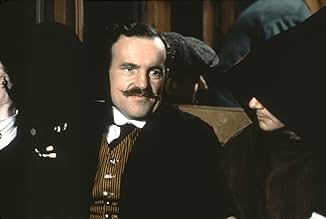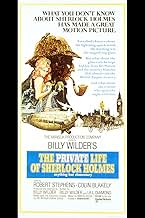Das Privatleben des Sherlock Holmes
Originaltitel: The Private Life of Sherlock Holmes
IMDb-BEWERTUNG
7,0/10
14.335
IHRE BEWERTUNG
Als ein gelangweilter Holmes nach einem Mordversuch den Fall Gabrielle Valladon aufgreift, führt die Suche nach ihrem vermissten Ehemann nach Loch Ness und dem legendären Monster.Als ein gelangweilter Holmes nach einem Mordversuch den Fall Gabrielle Valladon aufgreift, führt die Suche nach ihrem vermissten Ehemann nach Loch Ness und dem legendären Monster.Als ein gelangweilter Holmes nach einem Mordversuch den Fall Gabrielle Valladon aufgreift, führt die Suche nach ihrem vermissten Ehemann nach Loch Ness und dem legendären Monster.
- Regie
- Drehbuch
- Hauptbesetzung
- Auszeichnungen
- 3 Nominierungen insgesamt
Geneviève Page
- Gabrielle Valladon
- (as Genevieve Page)
Empfohlene Bewertungen
Billy Wilder's excellent 1970 film handles the whole subject of Sherlock Holmes from a refreshingly different angle. As the title suggests, the film is rather more concerned with characterisation than plot, which although entertaining and original, is hardly an adequate stage to show off Holmes' exceptional talents.
Instead, Wilder and Diamond start with the premise that "Watson's" stories for Strand Magazine were a little more lurid than the "reality" and use it to develop a more subtle characterisation than the "thinking machine" of the literary Holmes. Admittedly, the film probably concentrates on Holmes' celebrated cocaine habit more than it should, but all references are lifted straight from the book and in any case, Stephens does not dwell on it.
Stephens himself is quite simply excellent, giving Holmes' a depth of character not seen again until Jeremy Brett on the small screen. Stephens' performance leaves us with a slightly melancholy Holmes', a man who perhaps regrets that, unlike Watson, he has dedicated his life to pure reason and while the screenplay hints at Holmes' sexuality, Stephens deflects it masterfully, remaining ambivalent and gentile where a less accomplished actor would have been simply camp, and so uses the suggestion to wrap another layer of ambiguity about the character.
All in all, Wilder and Stephens combine to make a refreshingly accessible Holmes and the entertainment comes from the interplay of characters rather than pace of plot.
Instead, Wilder and Diamond start with the premise that "Watson's" stories for Strand Magazine were a little more lurid than the "reality" and use it to develop a more subtle characterisation than the "thinking machine" of the literary Holmes. Admittedly, the film probably concentrates on Holmes' celebrated cocaine habit more than it should, but all references are lifted straight from the book and in any case, Stephens does not dwell on it.
Stephens himself is quite simply excellent, giving Holmes' a depth of character not seen again until Jeremy Brett on the small screen. Stephens' performance leaves us with a slightly melancholy Holmes', a man who perhaps regrets that, unlike Watson, he has dedicated his life to pure reason and while the screenplay hints at Holmes' sexuality, Stephens deflects it masterfully, remaining ambivalent and gentile where a less accomplished actor would have been simply camp, and so uses the suggestion to wrap another layer of ambiguity about the character.
All in all, Wilder and Stephens combine to make a refreshingly accessible Holmes and the entertainment comes from the interplay of characters rather than pace of plot.
This is fun. It wouldn't be if it had strayed too far from the Holmes persona or if it were not a good movie. Holmes is a favorite from childhood, and odd take-offs on him are generally not appreciated. I have settled on the Jeremy Brett series as the definitive version, but enjoy others that are well done. To me, with remakes and other versions, if the piece is well done, it is not only acceptable but enjoyable. With remakes, I don't know what's worse - it being a general flop as a movie or their changing it all around and calling it the same thing. Sometimes, both happen. Usually, if you like the subject matter, you will probably like a good adaptation, if a bit more inventive that the source material. The Seven Percent Solution movie was well done and enjoyable.
I haven't seen a lot of Robert Stephens, but have appreciated what I have. I looked him up and found that this was pretty light fare for his experience. This is a quality portrayal by him, and the others do a good job as well. The overall production is pleasing. The Dr. Watson portrayal mystifies a bit, that here and in other things, they make him sort of ditsy. That doesn't fit the original stories, nor what Holmes' temperament would seem to tolerate as a companion or assistant with his careful work. Maybe it came from the early Rathbone series with Nigel Bruce. Whether intentional or not, he nearly always had a bumbler quality to his portrayal.
This is a worthy production in all aspects, which I would think garnered some critical approval at its time of release. I can see why it would take the public a while to adjust to seeing Sherlock Holmes as presented here. But, it speaks of the film's overall quality that it has aged well.
I haven't seen a lot of Robert Stephens, but have appreciated what I have. I looked him up and found that this was pretty light fare for his experience. This is a quality portrayal by him, and the others do a good job as well. The overall production is pleasing. The Dr. Watson portrayal mystifies a bit, that here and in other things, they make him sort of ditsy. That doesn't fit the original stories, nor what Holmes' temperament would seem to tolerate as a companion or assistant with his careful work. Maybe it came from the early Rathbone series with Nigel Bruce. Whether intentional or not, he nearly always had a bumbler quality to his portrayal.
This is a worthy production in all aspects, which I would think garnered some critical approval at its time of release. I can see why it would take the public a while to adjust to seeing Sherlock Holmes as presented here. But, it speaks of the film's overall quality that it has aged well.
This has always been one of my favorite movies. A good take on Holmes, a witty story, a bittersweet ending and music by Miklos Rozsa that sets the tone perfectly. When I saw it had become available on DVD I rushed out and bought it, without even checking to see the extras on the disc. The quality of the print is all right, but there are times it should have been better. The extras just kept getting better. Christopher Lee remembers his times playing Holmes in other films as well as Mycroft in this movie. Then there's the film editor who mentions parts of the movie I never heard of. Then the disc shows the deleted scenes in various forms and it's amazing what was cut. There is only one little bit I feel would have explained things in the movie better, but all the scenes are interesting. A must for people who love this film and want a wealth of information.
Billy Wilder's take on the world's most famous detective is both painstakingly faithful and sardonically subversive to Sir Arthur Conan Doyle's idiossyncratic creation. Presented as a case that loyal companion John Watson duly recorded but requested remain secret until long after his death, in which Holmes aids a Belgian woman find her missing husband, a mining engineer hired by an apparently non-existant English company, it makes clever use of the rulebook Conan Doyle set down while at the same time undermining it from within. The title and the plot may seem misleading at first - the first half hour especially seems at odds with what comes afterwards - but in fact if you're a Holmes fan you'll quickly realise that this is as close to romance as the detective would ever allow, and Wilder tells it through a masterful accumulation of small touches that only someone as meticulous as the man himself would notice. Script-wise, it's a cracking mystery in the best Doyle tradition, with all the time-honoured twists and turns present and correct. The acting is also up to Wilder's usual standards; Stephens and Blakely are an engaging duo as a bored Holmes and a bumbling Watson, and there's a hysterically funny supporting turn by the always underrated Revill as a Russian ballet impresario. Wilder's trademark pointed cynicism fits the English witticism particularly well, even if at times it all seems a bit too modern for the peaceful Victorian surroundings, but it is quite ironic to see him chiding Britain's stiff-upper-lip, old-fashioned morality when the film seems to be an "old timers' movie" entirely out of sync with its own time. Still, it's hard to find fault in such a thoroughly civilised and delightful entertainment.
Sherlock Holmes is certainly one of literature's all-time most famous characters, the subject of countless novels and short stories by Sir Arthur Conan Doyle between 1887 and 1927. Since then, he has become possibly the most portrayed movie character in cinema history {according to the Guinness Book of Records, over 70 actors have played the coveted part in more than 200 films}. So rich was Conan Doyle's description of Holmes that many readers have come to think of him as a historical figure, and derive enjoyment from speculating on the finer detail's of the private detective's life. Likewise, many authors and filmmakers have decided to expand on the stories of Sherlock Holmes, creating new mysteries that perhaps Dr. John Watson forgot to publish. 'The Private Life of Sherlock Holmes (1970)' is such a tale, directed by master filmmaker Billy Wilder, who also produced and co-wrote {with long-time collaborator I.A.L. Diamond} the film.
'The Private Life of Sherlock Holmes' was originally written and filmed as a three-hour roadshow picture, an episodic compilation of Sherlock Holmes' most difficult mysteries. Unfortunately, the studio's unwillingness to take a risk with such a format meant that entire sequences, including a prologue with Watson's grandson in London, and a flashback to Holmes' university years, were inharmoniously cut from the film. Though I was initially unaware of this studio intervention, I met these findings with anger and frustration; while the surviving picture is merely a good film, Billy Wilder's original vision would certainly have been something special. I hear that at least one episode has been restored into later DVD editions of the film, but most of the missing footage remains, devastatingly, permanently absent. The story, as we now find it, is comprised of two unequal portions: the first concerns Holmes' interactions with a glamorous ballet dancer (Tamara Toumanova), casting doubt on the famous detective's sexuality, while the second mystery demonstrates the efforts of Holmes and Watson to locate the husband of an beautiful woman (Geneviève Page) suffering from amnesia.
When little-known British actor Robert Stephens first appeared on screen as Det. Sherlock Holmes, I wasn't certain that he was the suitable man for the job {Wilder had initially considered Peter O'Toole as Holmes, and Peter Sellers as Watson, before deciding to cast unknowns}. However, despite initially appearing too flamboyant to play Conan Doyle's brilliant investigator, I'm happy to say that, by the end of the film, he had well-and-truly grown on me. While Stephens didn't quite match the stories' depiction of Holmes, this is only because Dr. Watson's dramatisations often tend to embellish the truth and misrepresent facts about the detective's personality and demeanour a point that is alluded to early in the film itself. Colin Blakely, though given very little to do, is a lot of fun as Holmes' companion and biographer, playing the role a lot less serious than I've seen it done in the past. Christopher Lee also appears as Holmes' intellectually-equal brother Mycroft, whose associations with the British government may prove crucial to the case being investigated.
'The Private Life of Sherlock Holmes' was originally written and filmed as a three-hour roadshow picture, an episodic compilation of Sherlock Holmes' most difficult mysteries. Unfortunately, the studio's unwillingness to take a risk with such a format meant that entire sequences, including a prologue with Watson's grandson in London, and a flashback to Holmes' university years, were inharmoniously cut from the film. Though I was initially unaware of this studio intervention, I met these findings with anger and frustration; while the surviving picture is merely a good film, Billy Wilder's original vision would certainly have been something special. I hear that at least one episode has been restored into later DVD editions of the film, but most of the missing footage remains, devastatingly, permanently absent. The story, as we now find it, is comprised of two unequal portions: the first concerns Holmes' interactions with a glamorous ballet dancer (Tamara Toumanova), casting doubt on the famous detective's sexuality, while the second mystery demonstrates the efforts of Holmes and Watson to locate the husband of an beautiful woman (Geneviève Page) suffering from amnesia.
When little-known British actor Robert Stephens first appeared on screen as Det. Sherlock Holmes, I wasn't certain that he was the suitable man for the job {Wilder had initially considered Peter O'Toole as Holmes, and Peter Sellers as Watson, before deciding to cast unknowns}. However, despite initially appearing too flamboyant to play Conan Doyle's brilliant investigator, I'm happy to say that, by the end of the film, he had well-and-truly grown on me. While Stephens didn't quite match the stories' depiction of Holmes, this is only because Dr. Watson's dramatisations often tend to embellish the truth and misrepresent facts about the detective's personality and demeanour a point that is alluded to early in the film itself. Colin Blakely, though given very little to do, is a lot of fun as Holmes' companion and biographer, playing the role a lot less serious than I've seen it done in the past. Christopher Lee also appears as Holmes' intellectually-equal brother Mycroft, whose associations with the British government may prove crucial to the case being investigated.
Wusstest du schon
- WissenswertesBy the time of filming, Sir Christopher Lee had become famous as Count Dracula. When he and Billy Wilder walked on the shores of Loch Ness at dusk, with bats circling overhead, Wilder said to him, "You must feel quite at home here."
- PatzerThe events start in August 1887 and apparently take place in the following weeks or, at most, months. However, Mycroft Holmes tells Queen Victoria that Kaiser Wilhelm II had Count Zeppelin working on dirigibles that could drop bombs on Buckingham Palace. Wilhelm II did not become Kaiser until 15 June 1888, and Zeppelin did not start constructing rigid airships until the 1890s.
- Alternative VersionenOriginally released at 125 minutes; the US laserdisc version adds 12 minutes of unreleased footage, including a sequence known as "The Dreadful Business of the Naked Honeymooners", featuring Jonathan Cecil and Nicole Shelby
- VerbindungenFeatured in The Many Faces of Sherlock Holmes (1985)
- SoundtracksConcerto for Violin and Orchestra Opus 24
by Miklós Rózsa
Top-Auswahl
Melde dich zum Bewerten an und greife auf die Watchlist für personalisierte Empfehlungen zu.
Details
- Erscheinungsdatum
- Herkunftsländer
- Sprachen
- Auch bekannt als
- The Private Life of Sherlock Holmes
- Drehorte
- Produktionsfirmen
- Weitere beteiligte Unternehmen bei IMDbPro anzeigen
Box Office
- Budget
- 10.000.000 $ (geschätzt)
- Weltweiter Bruttoertrag
- 19.930 $
Zu dieser Seite beitragen
Bearbeitung vorschlagen oder fehlenden Inhalt hinzufügen


